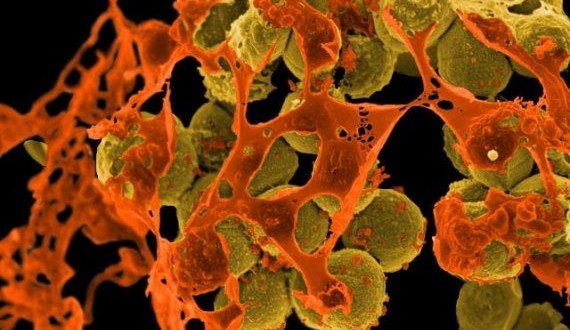A 1,000-year-old Anglo-Saxon salve of onion, garlic, and part of a cow’s stomach could potentially eradicate the MRSA superbug problem.
Researchers recreated a 9th Century Anglo-Saxon remedy by using onion, garlic and part of a cow’s stomach. While it might not sound too appetizing and you may wonder how it could possibly help fight these super strong bugs, the results actually astonished scientists.
It seems our ancestors knew what they were doing after all. Scientists were surprised to find that this ancient treatment almost completely wiped out methicillin-resistant staphylococcus aureus, otherwise known as MRSA.
The remedy was found in Bald’s Leechbook – an Old English manuscript that contains instructions on various ancient treatments. Anglo-Saxon expert Dr. Christina Lee, from the University of Nottingham, translated the recipe for an “eye salve”, which includes garlic, onion or leeks, wine and cow bile.
Researchers from the university’s microbiology team used the translation to recreated the remedy and then tested it on large cultures of MRSA. They found that the remedy killed up to 90 percent of the MRSA bacteria and believe that it is the effect of the recipe and not any one single ingredient.
Dr. Freya Harrison said the team thought the eye salve might show a “small amount of antibiotic activity”.
“But we were absolutely blown away by just how effective the combination of ingredients was,” Harrison says.
Dr. Lee said there are many books from the same time periods that are similar and appear to address the treatment of bacterial infections. She said this could suggest people were carrying out detailed scientific studies centuries before bacteria were discovered.
The leechbook is one of the earliest examples of what might be considered a medical textbook. It seems Anglo-Saxon physicians may actually have practiced something close to the modern scientific method, with an emphasis on both observation and experimentation.
Bald’s Leechbook could hold some important lessons that could aid in the fight against anti-microbial resistance.
For those of you who are interested in creating your own Bald’s eye salve, the recipe calls for equal amounts of garlic and another allium such as onions, both finely chopped and crushed in a mortar for two minutes. You then add 25ml of English wine and dissolve bovine salts in distilled water and combine the mixtures and chill for nine days at 4 degrees Celsius.
Agencies/Canadajournal
 Canada Journal – News of the World Articles and videos to bring you the biggest Canadian news stories from across the country every day
Canada Journal – News of the World Articles and videos to bring you the biggest Canadian news stories from across the country every day




Congratulations to today’s medical scientists for once again respecting the science of our ancestors by reporting their findings in Bald’s Leech Book. But give me a break: “Scientists were surprised to find that this ancient treatment almost completely wiped out methicillin-resistant staphylococcus aureus.” The really big surprise is that our modern scientists were allowed to mention the source of their information.
Scientists are always researching past knowledge of practical cures. It is then left to profiteers to cook up a patent and market the “new” idea in ways that suck the rest of us back in to our narrow narcissistic world-view that we’ve mysteriously and luckily just make the world once again a safer place……for profiteers.
At least our ancestors shared their wisdom without patent law and technology giants skewering each other for greater profitability. And that, more than modern medicine, may be why we are alive today.